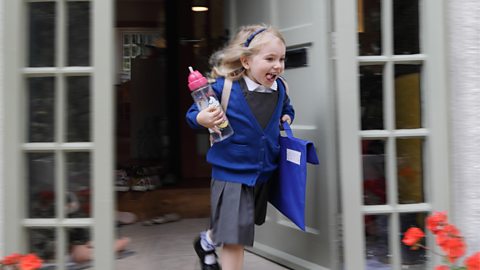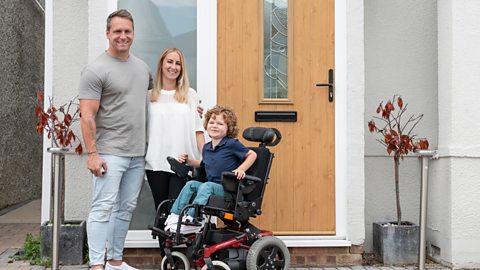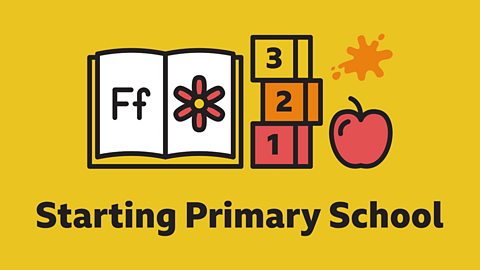This article was updated in June 2023
The school application process can be daunting, so if you are not sure where to start, this guide gives you a detailed overview of how to apply for a school place across England, Scotland, Wales, and Northern Ireland - as well as links to plenty of other helpful resources.
Also check out our handy guide to the questions to ask when looking round a primary school, written by headteacher Dave McPartlin.

England
When do children start school?
Children are eligible to start school (Reception) in the academic year following their fourth birthday.
Although most children start school in the September after their fourth birthday, children don’t have to be in education until a 'set date' following their fifth birthday; this is known as the Compulsory School Age. The set dates are the 31st December, 31st March and 31st August.
There is the option to delay a child’s start date if you feel your child is not ready to start school full-time in the September following their fourth birthday. We would recommend discussing delayed admission and part-time admission with the schools you are applying to.
‘Summer-born children’ are those born between 1st April and 31st August. Parents of summer-born children can request that their child start Reception in the September following their fifth birthday, rather than going straight into Year One alongside children of the same age group. It is important to note that it’s generally agreed that it’s best for children to be educated in their normal age group, so the decision to admit a child outside of their normal age group is only made in limited circumstances - for example, where there is professional evidence in support of the request.

Important dates for admission
The individual Local Authority will set the date from which you can start applying for primary school places. This information will be available on your Local Authority website or by phoning or writing to the Local Authority directly.
The deadline for ‘on-time’ applications is usually in the middle of January, this year the deadline is January 15th 2024. Late applications will still be considered but there is less chance of getting a place at one of your preferred schools.
Primary Schools National Offer Day is 16 April or the next working day if the 16th is a weekend or bank holiday.
The application process
You can make an application for a school place through your Local Authority – find yours here.
Each Local Authority should publish an admissions booklet online that explains their application process and should include a directory with a list of schools’ details, admissions policies etc.
It’s a really good idea to do some of your own research in the lead up to applying for a school place. This could include:
Attending Open Days
Reading the Schools Admissions Criteria (see below)
Consulting Ofsted Inspection Reports
This is to check that your child is eligible for the schools that you want to apply to.
Local Authorities must provide a Common Application Form (CAF) for you to put in your preferences for a place at state-funded schools. You must be able to name a minimum of three schools in order of preference and the form should allow you to provide reasons for why these are your preferences. Listing three schools means that if your first preference school is unable to offer a place, there are other options to go with.
It is important to be truthful about the information you give on the application form. The information will often be checked and a place could be withdrawn if it’s found that you submitted a fraudulent application.
School admissions criteria
All applicants must be offered a place if the school is not oversubscribed.
If a school is oversubscribed, that is when more parents applied for a place than the number of places available, then the school uses its oversubscription criteria to decide the priority order in which places are allocated.
The government allows the admission authority some leeway in how they decide on their oversubscription criteria, but in all schools the highest priority must be given to looked-after children and previously looked-after children - that is children who are, or have been, in the care of the local authority such as foster care.
Other examples of criteria that are often used are:
Children with a sibling attending the school
Children living in the catchment area (you can contact the schools in advance and ask for details of their catchment area)

Allocation of places
Your child will be added to a list for each of the schools you’ve named on the Common Application Form. The list for each school is then ranked by whether children meet the admission criteria for that school, and this will determine if a place can be offered.
Admission authorities are now legally required to operate an ‘equal preference system’. This means that places are purely allocated according to the admissions criteria and not on the basis of where the school was listed on the parent’s application. Therefore, even if a parent put a school as a second choice their child could still be offered a place ahead of another child whose parents had put the school down as a first choice. It is all about the extent to which the child meets the oversubscription criteria.
If a child is not offered a place at any of the schools a parent has named on their form, the Local Authority will offer a place at the nearest school with a space available.
Infant class size
Reception classes, as well as Year One and Year Two, are known as infant classes. There is a legal limit for class sizes in infant classes of 30 children per teacher. The legal class size limit has a number of exceptions to allow some schools to have classes above the maximum in certain permitted circumstances, such as where an extra place is required to accommodate twins, or a looked-after child or a child of armed forces personnel.
Waiting list and appeal
A child’s name can be added to the waiting list for any school that you’ve applied for but have not been offered a place at. Schools must keep a waiting list for at least one term and you can ask the school how the waiting list is ordered. It is important to note that children can move down the waiting list if other children who have greater priority, in accordance with the oversubscription criteria, join the list.
A parent will automatically have a right of appeal to each individual school their child has been refused a place at. Visit the Child Law Advice Service website for further information on lodging an appeal in England.

Wales
There are some important differences between England and Wales when applying for a primary school place. The first decision is whether to choose Welsh-medium or English-medium education for your child. You can find out about all the schools available to you on your local authority website.
Details of how to apply for a school place in Wales can be found here.
When do children start school?
Children in Wales can begin Meithrin/Nursery from three years old. This is called the Foundation Phase. The age of a child on 1st September determines when they start primary school and your child must start school full -time in the term after they are five.
Important dates
The date when the application process opens and closes varies from local authority to local authority, so it is important to check the website of the council where you live. You will find out which school your child has been offered a place on Primary Schools National Offer Day. This is 16 April or the next working day if the 16th is a weekend or bank holiday.
The application process
You can make an application for a school place through your local authority – find yours here.
Each local authority should publish an admissions booklet online that explains their application process and should include a directory with a list of schools’ details, admissions policies etc.
It’s a really good idea to do some of your own research in the lead up to applying for a school place. This could include:
• Attending Open Days
• Reading the Schools Admissions Criteria (see below)
• Consulting Estyn inspection reports
This is to check that your child is eligible for the schools that you want to apply to.
Local authorities will provide you with an application form, check their website. Most local authorities' application forms will offer you the opportunity to put down more than one school. It is important to use all the preferences available to you, as this will give you other options if you aren't accepted for your first choice.
It is important to be truthful about the information you give on the application form. The information will often be checked and a place could be withdrawn if it’s found that you submitted a fraudulent application.
School admissions criteria
If a school is oversubscribed, that is when more parents applied for a place than the number of places available, then the school uses its oversubscription criteria to decide the priority order in which places are allocated.
The government allows the admission authority some leeway in how they decide on their oversubscription criteria, but in all schools the highest priority must be given to looked-after children and previously looked-after children - that is children who are, or have been, in the care of the local authority such as foster care.
Other examples of criteria that are sometimes used are:
• Children with a sibling attending the school
• Children living in the catchment area (you can contact the schools in advance and ask for details of their catchment area)
• Children whose parents have expressed a preference for a school
Appeals
If you do not get a place at your preferred school you may appeal against the decision. The appeal will be heard by an independent appeals panel within 30 'school days'.


Scotland
When do children start school in Scotland?
Children born between…
1 March 2019 – 28 February 2020 will start School August 2024
1 March 2020 – 28 February 2021 will start School August 2025
1 March 2021 – 28 February 2022 will start School August 2026
1 March 2022 – 28 February 2023 will start School August 2027
1 March 2023 – 28 February 2024 will start School August 2028
And so on…
Deferring the start of school
If you child is still only four years old on the date they are due to start primary school, you may defer their start date by a year.
Check here to find out about early years and childcare funding.
The application process
The admissions process in Scotland is different to that for England and Wales in a number of ways.
In many local authority areas, the council will send out a letter offering your child a primary school place, all you need to do is send a reply confirming the place. In other areas, you need to enrol your child with the local council in the year before they are due to start school. Check the website of your local authority for details or search via your postcode here.
How places are decided
The local council decides which school your child will attend based on the catchment area of each school - that is the defined area around the school. Check your local council’s website to see which school your child will be offered a place at.
If you don’t want your child to attend the catchment school, you can send a placing request for a different school and this must be approved as long as there are places. If there are no places you will need to find another school that does have places, or accept the catchment school.
For more information about schools in your area go to the Parent Zone website.


Northern Ireland
When do children start school in Northern Ireland?
All children normally start primary school in the September of the year they are four, specifically if they have reached four-years-old by the 1st of July in that year.
Important dates
You can apply for a school place in the January of the year your child is due to start school. There is an online application process via the Education Authority website. You need to list four schools you prefer, or more than four if there are likely to be more applications than places. Letters offering school places are sent out in May. If you are not offered a place at one of your preferred schools you will be given information about schools that still have places available.
How decisions are made
Schools make decisions about who is offered a place based on their admissions criteria, which are drawn up by the Board of Governors and published on the school’s website. Criteria vary from school to school but they must be fair, clear and based on facts.
If you feel that a school has not applied its admissions criteria accurately you may appeal. Find out more about the appeals process here.
Special Educational Needs and Disabilities (SEND)
For more information about applying for a school place for a child with SEND take a look at our guide.
Written in association with Mairead Meadows and Richard Oldershaw of the Coram Child Law Advice Service.
Know someone who has recently started school or will be beginning next September? Check out the rest of Starting Primary School which has lots of ways to help prepare children for different aspects of school life – both practically and emotionally.

More from BBC Bitesize Parents' Toolkit…
Parents' Toolkit
Fun activities, real-life stories, wellbeing support and loads of helpful advice - we're here for you and your child.

Primary school places: what to do now you've got an offer
All you need to know now you've received a primary school offer, including how to appeal if you didn't get your first choice

Things to consider on a school visit for your child with SEND
Questions to ask while visiting a mainstream or specialist school for your child with SEND.

Things to think about and questions to ask when visiting a primary school
Headteacher Dave McPartlin reveals his tips for what to look out for and ask on a school visit.

Louise Pentland’s five tips to get you through the school year
Louise shares her top tips for managing the school year from prepping lunches to school admin.

More Starting Primary School videos and articles
Head to our homepage to help you and your child prepare for starting primary school and thrive in school life.
